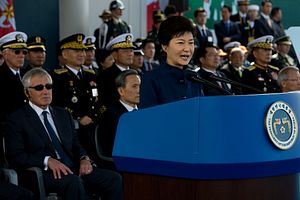With the local and by-elections behind her, President Park Geun-hye appears to have garnered the necessary political will to pursue bolder foreign policy measures. This is most evident in the Blue House’s proposal on August 11 for a high-level meeting with North Korean representatives at Panmunjeom.
President Park hinted at her intentions to re-engage Pyongyang at the inaugural meeting of the Unification Preparatory Committee on August 7, where she emphasized that her government’s objective was not to isolate North Korea. The proposal for the inter-Korean meeting that followed was the first time that the administration had unilaterally reached out to Pyongyang.
Reviving President Park’s concept of trustpolitik and the steps sketched out under the Dresden Doctrine, which advocated pursuing policies centered around the principles of “humanity, co-prosperity, and integration,” the Blue House announced its desire to discuss the possibility of organizing another round of family reunions this year. Staying true to the humanitarian agenda, Seoul also advanced its plans to provide $13.3 million in aid through the World Food Program and the World Health Organization to bolster nutritional support for North Korean children and mothers.
Meanwhile, cognizant of Pyongyang’s rejection of the Dresden Doctrine in April, Minister of Unification Ryoo Kihl-jae highlighted the proposed meeting as an opportunity to discuss details of the doctrine or the objectives of the Unification Preparatory Committee with North Korean counterparts.
To further encourage Pyongyang, the Blue House underscored its readiness to discuss any issue. This signaled the administration’s willingness to consider North Korea’s calls to end the May 24 Measure, sanctions suspending all inter-Korean economic cooperation (with the exception of the Kaesong Industrial Complex) until Pyongyang takes responsibility for the 2010 scuttling of the South Korean corvette Cheonan. As mentioned in an earlier article, Minister Ryoo had already established the grounds in June for repealing the sanctions without necessarily revisiting the sinking of the warship when he noted that “opportunities to end the May 24 Measure could arise as trust between the two governments are established.”
Nonetheless, there are significant stumbling blocks on Seoul’s path towards having a dialogue with Pyongyang.
First, the North Korean leadership may see little to no potential gains from engaging with Seoul at the moment. As an official from the South Korean Ministry of Unification stressed, the proposed meeting would be a place to broadly discuss the respective governments’ concerns, but not one where these issues are going to be resolved. In other words, the meeting is unlikely to result in the repealing of the May 24 Measure. Thus, due to the absence of immediate rewards, Pyongyang may determine that the meeting is not worthwhile.
Second, Seoul’s proposed date for the meeting, August 19, coincides with the annual joint U.S.-South Korea military training exercise Ulchi-Freedom Guardian. In July, Pyongyang advanced a proposal for the cessation of hostile military activities on the Korean Peninsula, specifically calling for the cancellation of the upcoming joint military exercise. At the time, Seoul rejected the proposal on the grounds that it lacked sincerity and called on Pyongyang to demonstrate its commitments to peace by ending its nuclear program. Given this spat, it is unlikely that Pyongyang will take kindly to Seoul’s calls for a meeting during the joint exercise, especially as Pyongyang threatens to carry out a nuclear weapons test in retaliation. While Seoul did mention that the date was subject to revision, there is no guarantee that merely changing the time of the meeting will significantly affect Pyongyang’s current attitude.
In short, the renewal of the public mandate for the Park Geun-hye administration has given Seoul the power to pursue more ambitious diplomacy with Pyongyang. However, this rare opportunity for the Blue House to push foreign policy agendas with the backing of the National Assembly could be stonewalled if North Korea remains unresponsive.

































